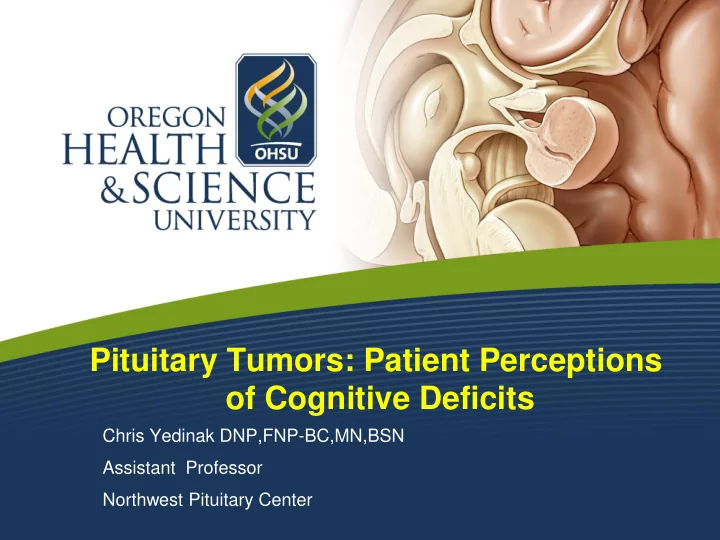

Pituitary Tumors: Patient Perceptions of Cognitive Deficits Chris Yedinak DNP,FNP-BC,MN,BSN Assistant Professor Northwest Pituitary Center
PITUITARY GLAND • Master gland • 15-27% of the population have pituitary tumors -1: 8,000 people worldwide • Pituitary tumors represent 15% of all brain tumors OHSU Northwest Pituitary Center
PITUITARY GLAND:
PITUITARY FUNCTIONS ESTROGEN OXYTOCIN TESTOSTERONE ADH CORTISOL GROWTH PROLACTIN HORMONE TSH OHSU Northwest Pituitary Center
AIM • To determine if cognitive deficits are perceived by patients with non functioning pituitary microadenomas (NFmA) when compared to patients with non-functioning macroadenomas (NFMA) OHSU Northwest Pituitary Center
NORMAL PITUITARY:
MICROADENOMA: < 1CM
MACROADENOMA: >1CM
LITERATURE REVIEW: • No studies comparing micro and macroadenomas for any functional parameter • Medline/Pubmed keywords: – QoL, pituitary adenomas, cognition, cognitive function
Quality of Life Is Decreased after Treatment for Nonfunctioning Pituitary Macroadenoma 2006 O. M. Dekkers et al Leiden University Medical Center, The Netherlands Journal of Clinical Endocrinology & Metabolism 91: 3364 – 3369, 2006 • 99 patients in surgical remission • 37/99 after radiotherapy – Hospital Anxiety and Depression Scale, – Multidimensional Fatigue Index, – Nottingham Health Profile, and Short Form-36 CONCLUSION: QoL is considerably reduced in patients after successful treatment of NFMA No evaluation of perception of cognition
STUDY DESIGN • Prospective Survey • Pre treatment assessment • Using modified FACTcog OHSU Northwest Pituitary Center
INCLUSION CRITERIA: • Evidence of Pituitary adenoma on MRI • De novo • No biochemical evidence of hyper- secretion.
EXCLUSION CRITERIA • Prior treatment for pituitary dysfunction • Concomitant, uncontrolled diseases • History of major life stressor within 6 months of treatment or at the time of re- evaluation OHSU Northwest Pituitary Center
FACT-Cog Version 3 Modified scale: • Perceived cognitive impairments: 16 items – Ability to learn – Concentration and distractibility – Memory & recall – Mental agility – Verbal recall
FACT-Cog Version 3: Psychometric Properties • Test Retest reliability cognitive impairments : Cronbach alpha 0.82 Wagner. L ( 2008) FACT-Cog Version 3 Psychometric properties presented at ICCTF Workshop October 2008: Measuring Perceived Cognitive Function. www.facit.org/LiteratureRetrieve.aspx?ID=42375
DEMOGRAPHICS: MICR0- MACRO- # Axis # Axis n=28 n n Mean Age Mean Age Def Def Female 36.25 8 2 48 8 4 Male 38.66667 6 7 54.8 6 7 p=0.099 37.45833 51.4
SCORING • Likert scale • Perception of dysfunction 1-5 1= No dysfunction 5= Severe dysfunction • Total score for dysfunction 0-16= none 16-32 = mild 33-64 = mod 65-80 = severe OHSU Northwest Pituitary Center
STATISTICAL ANALYSIS – PASW 18 • ANOVA- Total scores No sig. difference between groups p= 0.314
MEAN SEVERITY SCORES: P=0.027 Mean Severity SD +/- Score NF microadenoma 3.3 1.13 NF macroadenoma 2.6 6.1
CONCLUSION • Patients with pituitary adenomas, regardless of size, perceive cognitive dysfunction. • Comparison is needed with age, gender and culture matched peers. • Correlation with formal cognitive testing for each functional impairment is required. OHSU Northwest Pituitary Center
Recommend
More recommend